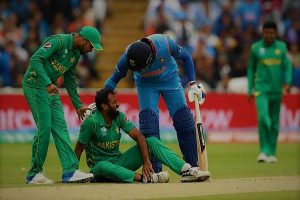
14-06-2017 (Important News Clippings)
To Download Click Here.
खानपान को पौष्टिक तत्त्वों से भरपूर बनाएगा जैव-सुदृढ़ीकरण

Corner of a shared field
Cricket continues to be a marker of the state of India-Pakistan political relations

India and Pakistan haven’t been playing bilaterally against each other since the 26/11 Mumbai attacks, except in 2012 when the Pakistani team came for a very short tour to India. The Government of India has taken a firm stand that cricket and cross-border terrorism can’t go side by side and, as a result, normal cricketing ties between the two nations have remained disrupted for nearly 10 years.
Cricket has become a marker of the state of political relations between the two countries and has been used as a diplomatic tool by leaders from both the sides. From Rajiv Gandhi to Atal Bihari Vajpayee and from Manmohan Singh to Narendra Modi, leaders have tried to use cricket to improve relations with Pakistan. India’s famous ‘goodwill tour’ to Pakistan in 2004 came after Mr. Vajpayee’s visit to Pakistan the same year to attend the SAARC summit.
In 2015, Mr. Modi called his Pakistani counterpart Nawaz Sharif and conveyed his best wishes for the World Cup. Mr. Modi said, “Cricket connects people in our region and promotes goodwill. Hope players from SAARC region play with passion and bring laurels to the region.” This led to speculation that bilateral cricketing ties could be resumed. After Mr. Modi’s surprise visit to Pakistan on Mr. Sharif’s birthday in December 2015, it was almost believed that the Indian cricket team could visit Pakistan for a tour sometime in 2016.All these hopes were shattered after the Pathankot attack, which happened just a week after the visit. This was a breach of trust at the highest level and, with an increasingly deteriorating situation in Kashmir later last year, all talks of resuming cricketing ties came to a full stop. The Board of Control for Cricket in India (BCCI) said ‘no’ to the Pakistan Cricket Board (PCB)’s call to resume cricketing ties, even as the PCB threatened to take legal action over non-compliance of the Memorandum of Understanding (MoU) signed in 2014.
For almost a decade, India has been playing against Pakistan only in ICC tournaments. However, this month, ahead of the match, a new debate emerged on whether India should boycott even that. The argument given was that boycotting Pakistan in international tournaments would be akin to making a firm political statement in front of the international community, much like the boycott of South Africa during the apartheid years. On the other side of the debate were former cricketers. They questioned the singling out of cricket. They said such a boycott should be extended to all fields, like other sporting events and trade. Amidst this, debate, India played and defeated Pakistan convincingly at Birmingham.
Martand Jha is a freelance writer based in Delhi
Date:13-06-17
The road from St. Petersburg
Nostalgia may be useful, but it cannot make up for a lack of substantive drivers in India-Russia ties
There has been a certain depressing pattern in India-Russia relations over the past decade. Annual summit-level meetings have been marked by expressions of nostalgia for the glory days of Indo-Soviet friendship , declarations of solemn intent to take contemporary relations to new heights and highlighting common perspectives even as the two countries mostly go their respective ways. The St. Petersburg Declaration issued at the end of Prime Minister Narendra Modi’s recent visit to Russia appears not much different in this respect.
Convergences, divergences
This is not to say that the two countries do not continue to have important convergent interests. Certainly there are specific areas such defence hardware and technology, nuclear energy and oil and gas where their cooperation is of mutual benefit. There may even exist longer-term convergence in helping shape a multipolar international political and security architecture.
However, these shared interests must be balanced against divergences that are inherent in the very dramatic transformations which have taken place in the two countries themselves, and in the regional and global situation since the end of the Cold War, which have inevitably altered the overall context of our relations. This altered context has to be acknowledged by both sides, and rather than cling to the assumptions of a very different past, there should be an unsentimental reckoning of both the challenges and opportunities that could define India-Russia relations in the new millennium.
It is fine to say that our relations are “immune” to the changes in the geopolitical situation. This is good political packaging but we should accept that in reality this is simply not true. India-Russia relations today are very different precisely because we are very different countries today and the world is very different from the 1960-1990 phase of the India-Soviet strategic partnership. The cordiality and mutual trust of the past may be leveraged to fashion a new relationship but they cannot substitute for a lack of substantive drivers in the relationship.
Let us look at how the key assumptions underlying the Indo-Soviet strategic partnership, pre-Cold War, has changed.
Shared China concerns
One, it is the shared perception of a Chinese threat which brought Delhi and Moscow together. The end of the Cold War changed this, with Russia no longer looking at China as a current security threat. The early settlement of their border dispute, the expansion in their economic and trade relations and the emergence of China as a major recipient of Russian weapons and defence technologies brought about an asymmetry in perceptions of China between India and Russia. But Russian perceptions of a long-term Chinese challenge to its interests persisted, and still do. For example, Russian nuclear experts have been reluctant to deep cuts in nuclear weapons in bilateral negotiations with the U.S. precisely because the gap with China’s expanding and qualitatively better nuclear arsenal is diminishing and this heightens Russian concerns. Chinese inroads into Central Asia and Eastern Europe are also a concern for Russia, which regards both these regions as part of its strategic periphery. These concerns may currently be muted because Russia needs Chinese support in confronting a hostile U.S. and Western Europe.What this means for India is that we need to adjust to a new and more positive phase in Russia-China relations, learn not to rely on Moscow to confront Chinese hostility towards India or support India against Pakistan, but seek to build a broader framework of relations based on the longer-term Russian concerns about the emergence of China. Russia, like India, prefers a multipolar world and is unlikely to accept a junior league status in a Chinese-dominated world. The St. Petersburg Declaration describes India and Russia as “great powers”. That is signal enough that neither is about to succumb to Chinese pretensions to singular dominance. For the same reason, Russia may welcome a higher-profile role by India in Eastern Europe and Central Asia. In this context, India should pursue the proposed Free Trade Agreement with the Eurasian Economic Union and seek to play a more active role in the Shanghai Cooperation Organisation as a member.
Two, it is in India’s interest to see an improvement in relations between Russia and the U.S. and Western Europe. It is the coordinated support of these three major partners of India which enabled us to overcome Chinese opposition and obtain the unprecedented waiver from the Nuclear Suppliers Group in 2008. This is no longer the case. The U.S. under President Donald Trump appeared to be moving in the direction of normalising relations with Russia, but this now seems unlikely as reports of Russian involvement in the American electoral process become more compelling. However, the very unpredictability of Mr. Trump and his roiling of the Western alliance confronts both U.S. allies and adversaries with the need to avoid misunderstanding and misperceptions. A more united and coherent European Union may well be open to re-engaging with Russia, and this should be encouraged by India. In an increasingly fluid international situation, an India which has strong relations with the U.S., Western Europe and Russia is in a unique position to play a larger geopolitical role. It can use its enhanced relations with each to upgrade its relations with the other major powers. This will also diminish Chinese pressures on India.
Defence, nuclear, energy ties
Three, India and Russia should focus on maintaining and expanding their already considerable cooperation in the defence hardware and nuclear energy sector. Both sectors are important to Russia as well as to India. The loss of the Indian market in these two areas would be a blow to Russia and they would deprive India of advanced technology not always accessible elsewhere. However, there is no need for India to accept terms and conditions which are onerous merely because of sentimentality. During the recent visit, one heard nothing about the fifth-generation fighter aircraft that the two sides had agreed to co-develop and produce almost a decade ago. It is probably just as well since whatever one had heard about the Russians constantly changing goal posts and revising costs did not augur well for India’s long-term interests. We should not have to go through another Admiral Gorshkov episode, which has left such a bitter taste.
Four, since the end of the Cold War, India sought to establish a strong, long-term energy partnership with Russia. While some important deals like the Sakhalin oil and gas project have been a success, the early promise of expanding cooperation in this sector has been mostly belied. Russia has seen its interests better served by giving priority to Western Europe and China. India has been rather low on the radar. In St. Petersburg, there was a reference to India and Russia setting up an “energy corridor” and another reference to the use of natural gas as a relatively clean and climate-friendly fuel. One hopes that this statement of ambitious intent is followed up with some concrete and practical steps. India has been reluctant to use gas for power generation. Does the joint statement signal a rethink in this regard and will Russia play a role as a major supplier? One will have to await details.
This 18th annual India-Russia summit appears to have been more substantive than the previous ones, and one hopes that in a rapidly evolving geopolitical landscape, India and Russia find a more realistic basis and more compelling reasons to work together. One’s assessment of Russia’s foreign policy remains: its current closeness to China is tactical; its long-term interest both globally and in its neighbourhood are not aligned with China. India should pursue its relations with Russia keeping this reality in mind.
Shyam Saran is a former Foreign Secretary and currently Member, Governing Board, Centre for Policy Research
चुनाव आयोग का दर्द
चुनाव आयोग की नाराजगी समझी जा सकती है। पिछले कुछ समय से जो लोग इलेक्ट्रॉनिक वोटिंग मशीन यानी ईवीएम की निष्पक्षता पर सवाल उठा रहे हैं, वे दरअसल चुनाव आयोग पर ही कीचड़ उछाल रहे हैं। ये वे लोग हैं, जो खुद ईवीएम के जरिये ही चुनाव जीतकर सत्ता में पहुंचे हैं। कुछ समय पहले हुए पांच राज्यों के विधानसभा चुनाव के बाद से कुछ जगह चुनाव आयोग को इस तरह निशाना बनाया जा रहा है, जैसे वह केंद्र सरकार के किसी सहायक अंग की तरह काम कर रहा हो। चुनाव आयोग ने अपनी तरफ से सफाई देने की तमाम कोशिशें कीं, यहां तक कि ईवीएम को हैक करने की चुनौती तक दी, लेकिन ये आरोप थमने का नाम नहीं ले रहे। अब आयोग ने कहा है कि उसे यह अधिकार दिया जाना चाहिए कि वह अपनी अवमानना करने वालों के खिलाफ कार्रवाई कर सके। विधि मंत्रालय को लिखे गए एक पत्र में आयोग ने कहा है कि उसकी हैसियत एक अर्द्धन्यायिक संस्था की है, इसलिए नियमों में संशोधन करके उसे यह अधिकार दिया जाना चाहिए कि वह अपनी अवमानना करने वालों के खिलाफ कार्रवाई कर सके। इसके लिए उसने पाकिस्तान के चुनाव आयोग का उदाहरण भी दिया है, जिसके पास ऐसा अधिकार है।
अक्सर यह कहा जाता है कि भारत में अगर कोई सबसे सम्मानित संस्था है, तो वह चुनाव आयोग ही है। कई मामलों में जो सम्मान चुनाव आयोग को दिया जाता है, वह संसद और न्यायपालिका तक को नहीं मिलता। इस सम्मान की सबसे बड़ी वजह है कि हमारे चुनाव आयोग की निष्पक्षता पर आमतौर पर संदेह नहीं किया जाता। इसका सबसे बड़ा प्रमाण है कि जितने बड़े पैमाने पर शांति से सरकारें भारत में बदलती हैं, उतनी दुनिया के बहुत ही कम देशों में बदलती हैं। चुनाव आयोग के इसी सम्मान के चलते हमने बैलेट बॉक्स वाले लोकतंत्र को बड़ी आसानी से ईवीएम वाले लोकतंत्र में बदल दिया, जबकि दुनिया के कई विकसित देश अब भी इसके लिए जूझ रहे हैं। तकनीक में वे हमसे आगे हो सकते हैं, लेकिन चुनाव आयोग की निष्पक्षता की स्वीकार्यता में वे अभी हमसे काफी पीछे हैं। इसलिए जो लोग अपनी चुनावी हार के बाद ईवीएम पर सवाल उठा रहे हैं, वे देश की अकेली सबसे सम्मानित संस्था की विश्वसनीयता को आहत कर रहे हैं। एक बड़ा सच यह है कि भारतीय मतदान प्रणाली की गड़बड़ियों और इससे जुड़े घपलों को किसी सरकार या किसी आंदोलन ने कम नहीं किया, बल्कि चुनाव आयोग ने खुद अपने प्रयासों से कम किया है।
क्या इसका समाधान यह है कि चुनाव आयोग को अवमानना करने वालों के खिलाफ कार्रवाई का अधिकार दे दिया जाए? अभी तक ऐसा अधिकार न्यायपालिका के पास है और वहां यह पिछले काफी समय से विवाद का केंद्र बना हुआ है। चुनाव आयोग की शिकायत जायज है, लेकिन यह ऐसा मसला है, जिसके कई पक्ष हैं और गंभीरता से विचार करने के बाद ही इस पर आगे बढ़ा जाना चाहिए। तब तक चुनाव आयोग के सामने यह रास्ता तो खुला ही है कि वह अपनी अवमानना करने वालों के खिलाफ अदालत के दरवाजे पर दस्तक दे सकता है। बेशक, यह कोई बेहतर स्थिति नहीं होगी कि चुनाव आयोग बेवजह मुकदमेबाजी में उलझे, लेकिन अपनी अवमानना के मामले में वह खुद ही न्यायाधीश बने, यह भी कोई अच्छी स्थिति नहीं है। ठीक यहीं पर एक और बात कहनी भी जरूरी है कि भारत का चुनाव आयोग दुनिया के बहुत से देशों के लिए एक आदर्श है, ऐसे आयोग के लिए यह शोभा नहीं देता कि वह किसी मुद्दे पर उस देश का उदाहरण दे, जहां लोकतंत्र कभी ठीक से स्थापित ही नहीं हुआ।

